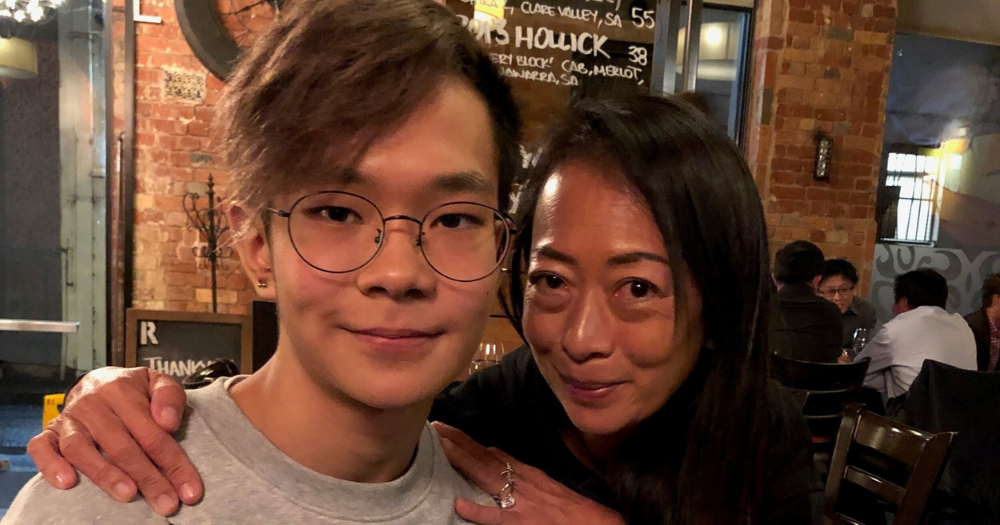Follow us on Telegram for the latest updates: https://t.me/mothershipsg
PERSPECTIVE: When Elaine Lek's son Zen was 17 years old, he took his own life after a battle with depression and generalised anxiety disorder.
In 2019, Lek and her husband Koh Say Kiong set up The Zen Dylan Koh Fund in memory of Zen, to support youth with mental health issues in need of therapy, especially those who struggle to find help or who cannot afford private therapy.
Together with other mothers who lost their children to suicide, Lek co-founded the PleaseStay movement, a non-profit group that works to raise awareness about and prevent youth suicide in Singapore.
Here is an abridged adaptation of Lek’s essay "For Zen", which was first published in White: Beyond Mental Health Stigma by Klin Studio.
White: Beyond Mental Health Stigma is a collection of personal narratives, critical research, and community work that reframe the way that mental health is looked at. More information about the book can be found here or @thewhitebooksg.
By Elaine Lek
Zen, my beloved firstborn, took his own life.
He was one month away from turning 18 and on his way to graduate from his pre-university Foundation Studies at Trinity College in Melbourne.
As a young boy, Zen was diagnosed with Dyslexia. He had struggled with his grades but managed to do well through his secondary school with proper help.
However, the first time we observed Zen becoming moody and somewhat withdrawn was in his first year at junior college.
We noticed that he started cutting himself and spoke to him about it, but he couldn’t explain why he did it.
We then brought him to seek professional help. He was diagnosed with Attention Deficit Disorder (ADD) and prescribed Medikinet, a commonly known study drug for ADD.
With the limited knowledge we had then, we left it at that, chalking up his struggles to drastic life changes and study stress.
Thought sending him overseas to study would help with pressure
We also thought that sending him to Melbourne and removing him from the pressures of the local school system could help with his struggles.
At first, he did seem very happy and well-adjusted academically and socially for most of his time in Melbourne. We visited and communicated with him very often and never noticed anything amiss.
 Zen and his friends. Photo via The Zen Dylan Koh Fund website.
Zen and his friends. Photo via The Zen Dylan Koh Fund website.
I shared a particularly close bond with Zen, especially in the last year when he started living in Melbourne. We messaged each other and did video calls several times daily despite being geographically apart.
Sometime after his third term in Melbourne, Zen’s friends called to tell us that he was not in a good place. I flew up almost immediately. I told him that we loved him and promised to get him professional help when he returned for his term break.
His previous psychiatrist was retiring when that happened, so we brought him to a new psychiatrist who diagnosed him with Generalised Anxiety Disorder and put him on Lexapro. This was an antidepressant drug that could potentially cause severe side effects in kids and adolescents — a fact we were not made aware then.
Upon his diagnosis and prescription, Zen told me, "Mummy, my body lacks serotonin, the happy hormones. I can be happier now!"
Became suicidal
When Zen left again for school in Melbourne two weeks later, he was alone once more, and without healthcare support. He became very sleep-deprived and suicidal, especially at night. I flew to him again.
Over a cosy dinner, we discussed setting up appointments to get him some help in Melbourne the very next day. He FaceTimed his father and said he was heading to the gym with his friends. He seemed happy.
We lost Zen that night.
A few hours later, I received a call that sent me running to my son’s boarding house just five minutes away from my hotel room.
Those were the longest minutes of my life.
Zen fought for his life for three days at the Royal Melbourne Hospital before we made the painful decision to let him go.
Experienced PTSD, anxiety, and suicide ideation after Zen's death
For the weeks and months that followed Zen’s passing, my body reacted acutely as a result of the trauma I experienced.
This presented itself as post-traumatic stress disorder (PTSD): physical pain, flashbacks and fears. Heart palpitations that escalated to chest pains became my constant companion.
My heart felt like it had been shattered into a billion pieces. Food tasted so bland and my weight plummeted.
I had a major meltdown on Zen’s 18th birthday, a month into my grief, and was screaming for friends to take me to a hospital for a jab to take away the pain.
Each time I would close my eyes, I would get flashbacks of the tragedy. I consumed alcohol and took non-addictive sleeping pills to fall asleep.
When I could sleep, I would get "anxious" dreams where I was always helpless, or I would wake up in the middle of the night with panic attacks from the realisation that this was all real.
If I was awake, I cringed in pain and agony. I was and still am afraid of dark quiet places. I left the TV and the lights turned on all day.
For the first month, I could not bear to leave the house. I had separation anxiety. It was at home that I felt most connected with my son and leaving the house made me feel so lost.
At some point, I knew that I was spiralling and needed support and professional help.
Pain has not lessened, but have learned to navigate it
To this day, the pain of missing, yearning and pining for my son has not gotten any lesser. I believe a mum will never stop grieving till her dying breath.
I have since learnt that there is no such thing as "moving on", words that we hear all the time.
I have learnt to cope hour-by-hour and now, day-by-day. I am still in the valley of anguish and pain, both physically and emotionally.
I continue to navigate the waves of grief but at least it does not crash over me.
The daily heart palpitations and anxiety have become my constant companions especially when I have a traumatic flashback, or when I am arrested by thoughts of not being able to see and hug my son again for a long time.
Other times, it’s a nagging ache in my heart. Now, I truly understand the meaning of heartache.
Sometimes I feel so breathless that I have to remind myself to breathe. I still hate waking up in the mornings. I still deal with the disappointment of being alive to face the whole cycle of grieving again.
But when I open my eyes each morning, I will greet Zen with "I love you and I miss you so much", and the thought that "mummy is one day closer to seeing you again".
Being present for younger son
It is not uncommon for a suicide-bereaved parent to also have suicidal thoughts. To fight the thoughts, I keep telling myself that I can’t fail Zen. When he sees me again, I want him to tell me with pride that I have done well.
I can’t be selfish at the expense of my younger son. Max still needs me. In a Mother’s Day letter to me, Max wrote that he wanted to see me find happiness again and that he would want to make memories with me. It touched me to the core.
So, amid everything, I remind myself to be present for Max. Max is my now!
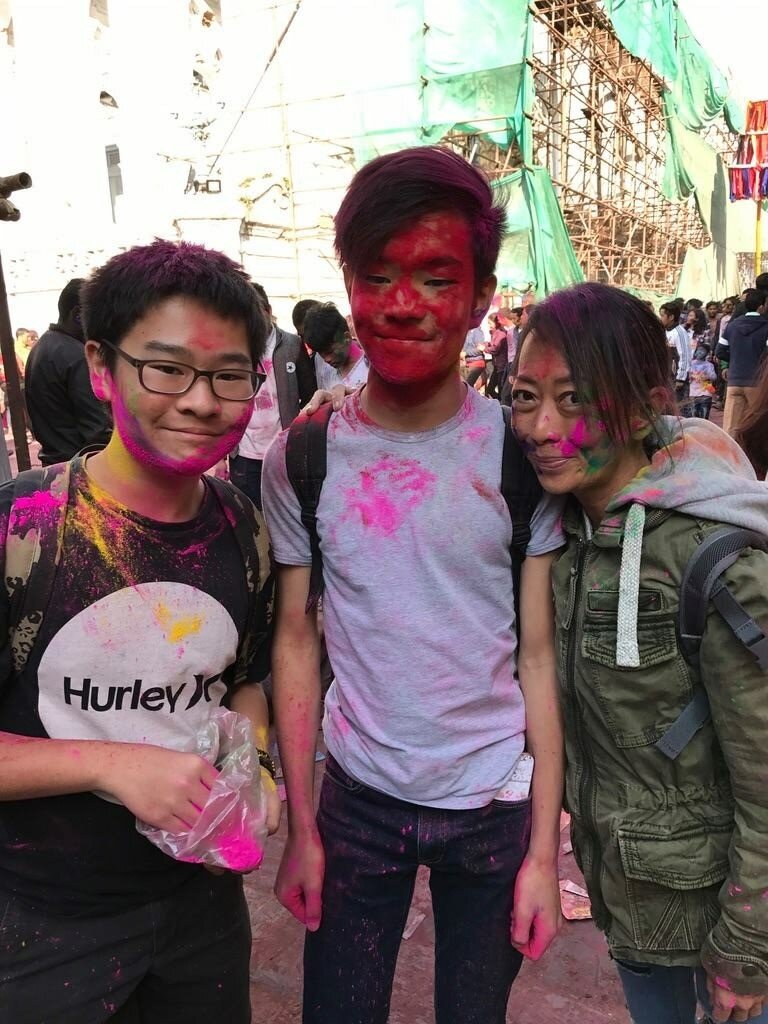 Lek with Max (left) and Zen (centre). Photo via The Zen Dylan Koh Fund website.
Lek with Max (left) and Zen (centre). Photo via The Zen Dylan Koh Fund website.
Likewise, I must not think of Zen as my past. He is still my present as well as my future. I long for the day where the dark clouds will dissipate.
Meanwhile, I am determined to deal with my grief head-on. I need to walk the rest of this journey as bravely as I can to be a great mother to Max.
I know that I need to honour my love for Zen in positive ways too. So, I pour what’s left of my energy into finding a sense of purpose in the weeks and days that followed.
Staying connected with Zen
Once the sun goes down my husband and I will light a candle for Zen on our balcony. We talk about our child with each other over whisky and look to the sky to speak to him.
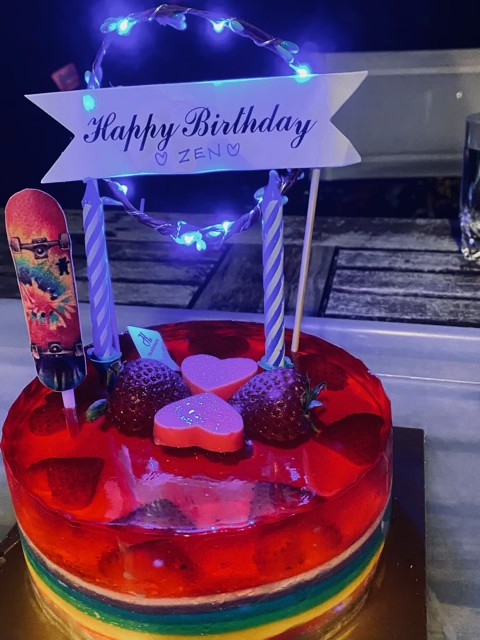 Photo courtesy of Elaine Lek.
Photo courtesy of Elaine Lek.
The balcony is where we often bonded over heart-to-heart conversations and hence, where we feel most connected to Zen. We continue to do so even when we are out of town.
When I need to feel close to my son, I wear his clothes. I have three tattoos on my wrists — one with both our names in an infinity sign; one inscribed with "we part only to meet again", reminding me that we will be reunited again; the third, a picture of Zen's favourite skateboard.
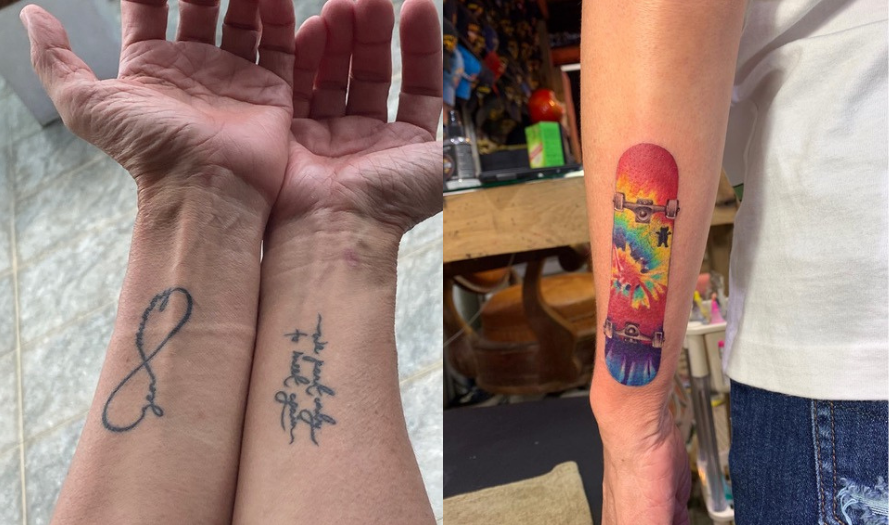 Photos courtesy of Elaine Lek.
Photos courtesy of Elaine Lek.
Every time I place my hands on the tattoos, I feel Zen holding and comforting me. I kiss them as a gesture of kissing him.
One month into my grief, I started a journal so that I could write to Zen daily. When I’m alone, I often have conversations with Zen in my head or out loud. I would hear him calling me “Mummy” and answering me when I call.
I had set up an Instagram account @zenmummyforever where I share photos of our precious memories with his close friends. I created a Spotify playlist "zenmummyforever", a mixtape of songs taken from his playlist and other songs that are poignant in describing my grief.
I continue to connect with my son as an act of hope and comfort. To this day, his mobile phone remains activated so that his close friends, as well as myself, can continue to message him. The family chat also continues to be active.
Finding solace in other mothers who have lost children to suicide
It was only when I met mums who had, like me, lost their precious children to suicide, that I found my solace and lifeline.
We share our innermost thoughts and feelings, we validate each other’s grief journeys. We still meet regularly at my house, where we allow ourselves to emote endlessly about our children.
We call it a night in heaven with our children gathered together. It is in each other’s company that we feel comforted.
We banded together to start a movement, "PleaseStay", that aimed to address the crisis of youth suicides and to break the stigma associated with depression and suicide.
The movement urges for a higher national priority in the agenda to elevate suicide prevention, increase awareness for help and support services amongst youths-at-risk and their families, and the need for whole-of-society approach in removing stigma and prejudice.
We felt that there was an urgency for more compassionate conversations and understanding of mental health issues in our society.
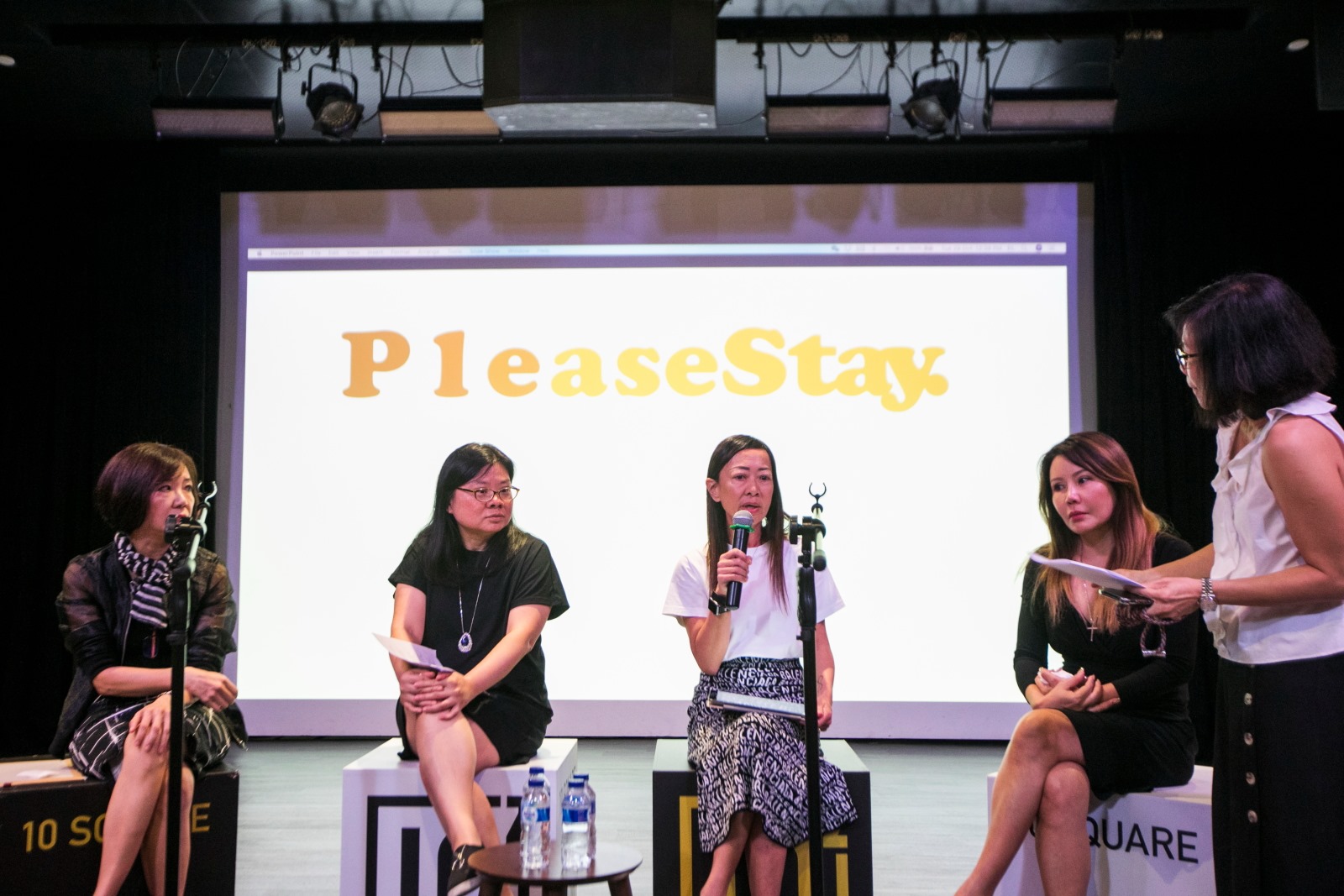 Lek (holding microphone) and other bereaved mothers at a PleaseStay event in 2019. Photo via Facebook / PleaseStay.
Lek (holding microphone) and other bereaved mothers at a PleaseStay event in 2019. Photo via Facebook / PleaseStay.
The objectives of this advocacy group are very close to my heart. I cannot stress enough how there is a need for better public education on mental health issues, drug use, and management.
I believe that there is still much denial among families whose children may be struggling with mental wellness. Oftentimes as parents, you might pass it off as all a part of growing pains.
“They will get over it,” you think to yourself. I believe it is necessary for an older generation to be actively more aware of the signs of mental illness, instead of denying them.
We need to be more informed as a society so that lives can be saved and our children can get the support they need.
I appreciate that there is a role for medication in the treatment of mental illness. Medication works differently for everyone and it's important to be educated on possible side effects of prescriptions.
After Zen's passing, I started researching Lexapro and found articles detailing the warnings, side effects, and the high risk of suicide ideation in youths, particularly in the first few months of starting treatment. I wasn’t advised on any of these risks.
I appeal to healthcare professionals to ensure the severity of serious antidepressant drugs with side effects are explained to parents diligently, along with the right course of management, home support, and supervision.
Zen always wanted to help others
After Zen had passed, my husband and I decided to donate Zen’s organs and today he lives in six people in Melbourne. He took his own life but selflessly gave six back.
We knew it was what he would have wanted because even in death, Zen will continue to be kind just like he was when he was alive.
We read all the messages on Zen’s phone and discovered he had been counselling many of his friends who were also struggling with mental health issues.
In a particular message to a friend, Zen wrote that he was born to be sad and that he was struggling to be happy for more than a week at a time. He said he wanted to bear all the sadness of this world because he couldn’t be sadder than he was already feeling.
Zen also wanted to be a psychologist to help kids with the same struggles. I think it was because he knew he could understand this pain.
So, this is my Zen! The boy who has touched so many lives with his love, care and friendship, reaffirmed by all the eulogies and messages from his friends after his passing.
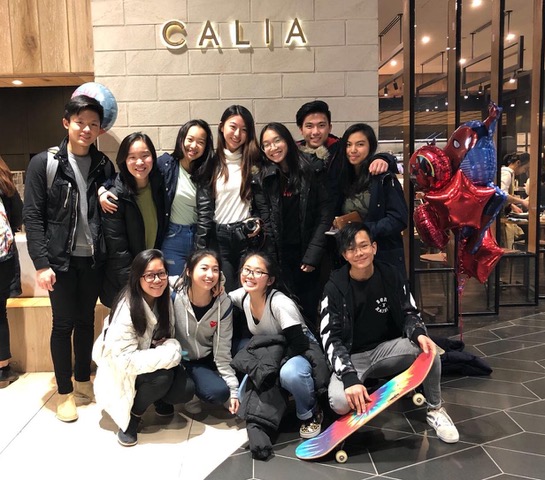 Zen (bottom right) with his friends. Photo courtesy of Elaine Lek.
Zen (bottom right) with his friends. Photo courtesy of Elaine Lek.
Zen’s selflessness led my husband and me to set up The Zen Dylan Koh Fund with Limitless, a non-profit organisation that helps youths with their mental well-being.
That morning when we launched it, we saw a beautiful rainbow appear from our balcony. We took it as a sign of approval from our son.
We miss our son deeply and we will continue to light a candle on our balcony every night. He is our guardian angel and we hope he finds his eternal bliss.
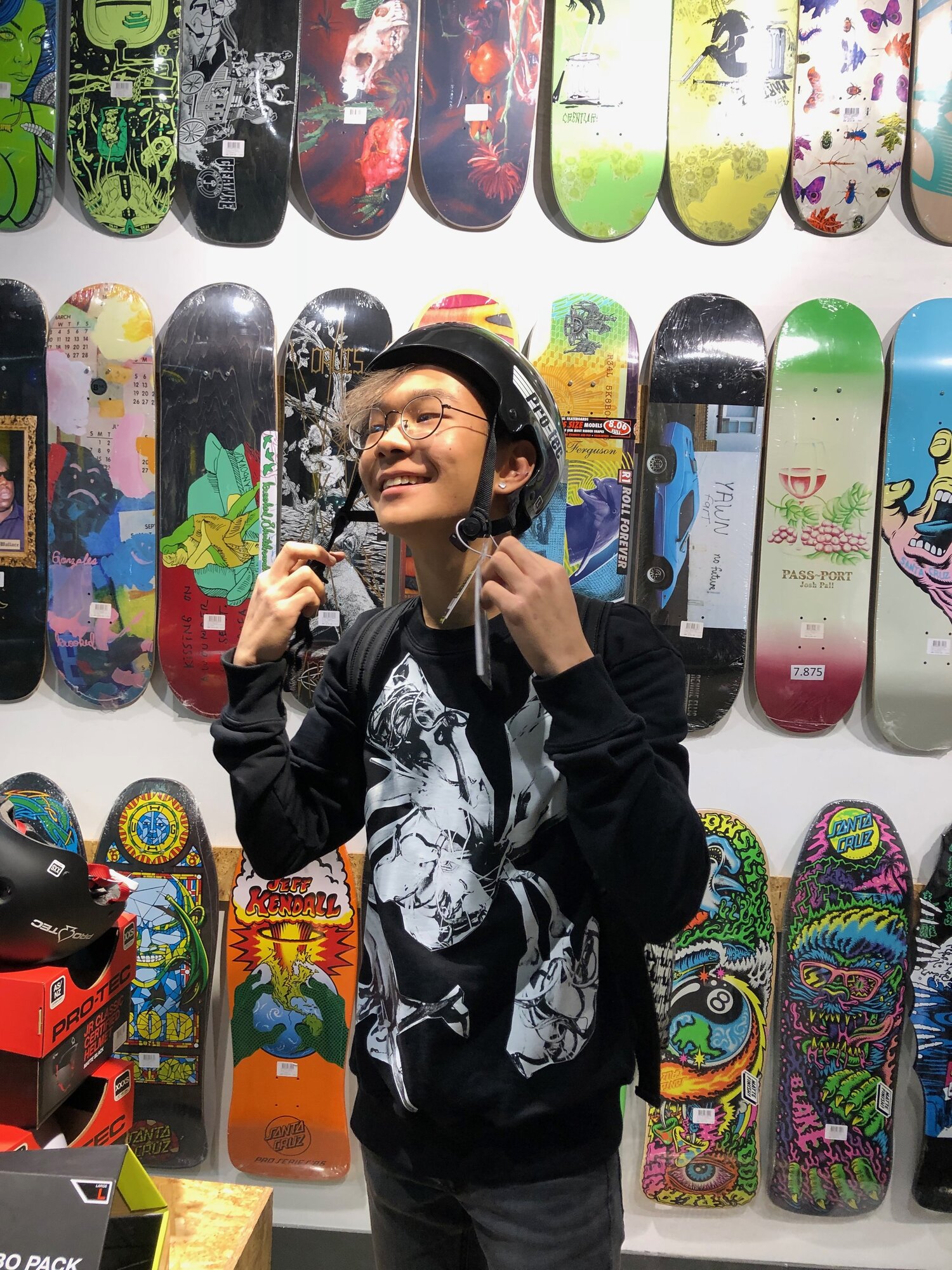 Photo via The Zen Dylan Koh Fund website.
Photo via The Zen Dylan Koh Fund website.
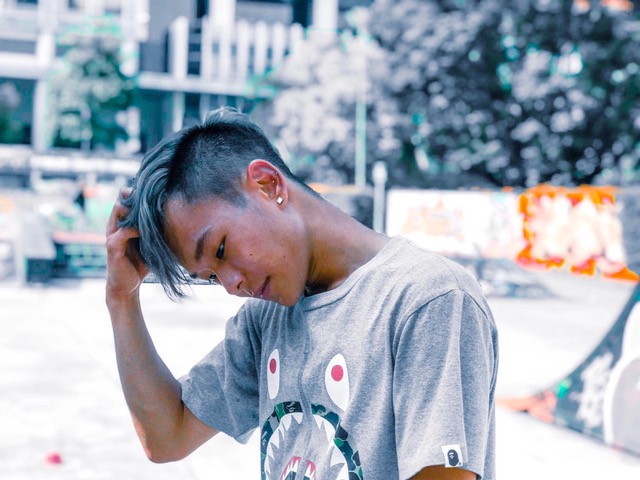 Photo courtesy of Elaine Lek.
Photo courtesy of Elaine Lek.
Helplines
If you or someone you know are in mental distress, here are some hotlines you can call to seek help, advice, or just have a listening ear:
National Care Hotline: 1800-202-6868
Samaritans of Singapore 24-hour Hotline: 1800-221-4444
Singapore Association for Mental Health: 1800-283-7019
Institute of Mental Health: 6389-2222 (24 hours)
Tinkle Friend: 1800-274-4788 (for primary school-aged children)
AWARE Women's Helpline: 1800-777-555 (10am - 6pm, Monday to Friday)
Top photo via The Zen Dylan Koh Fund website.
If you like what you read, follow us on Facebook, Instagram, Twitter and Telegram to get the latest updates.
